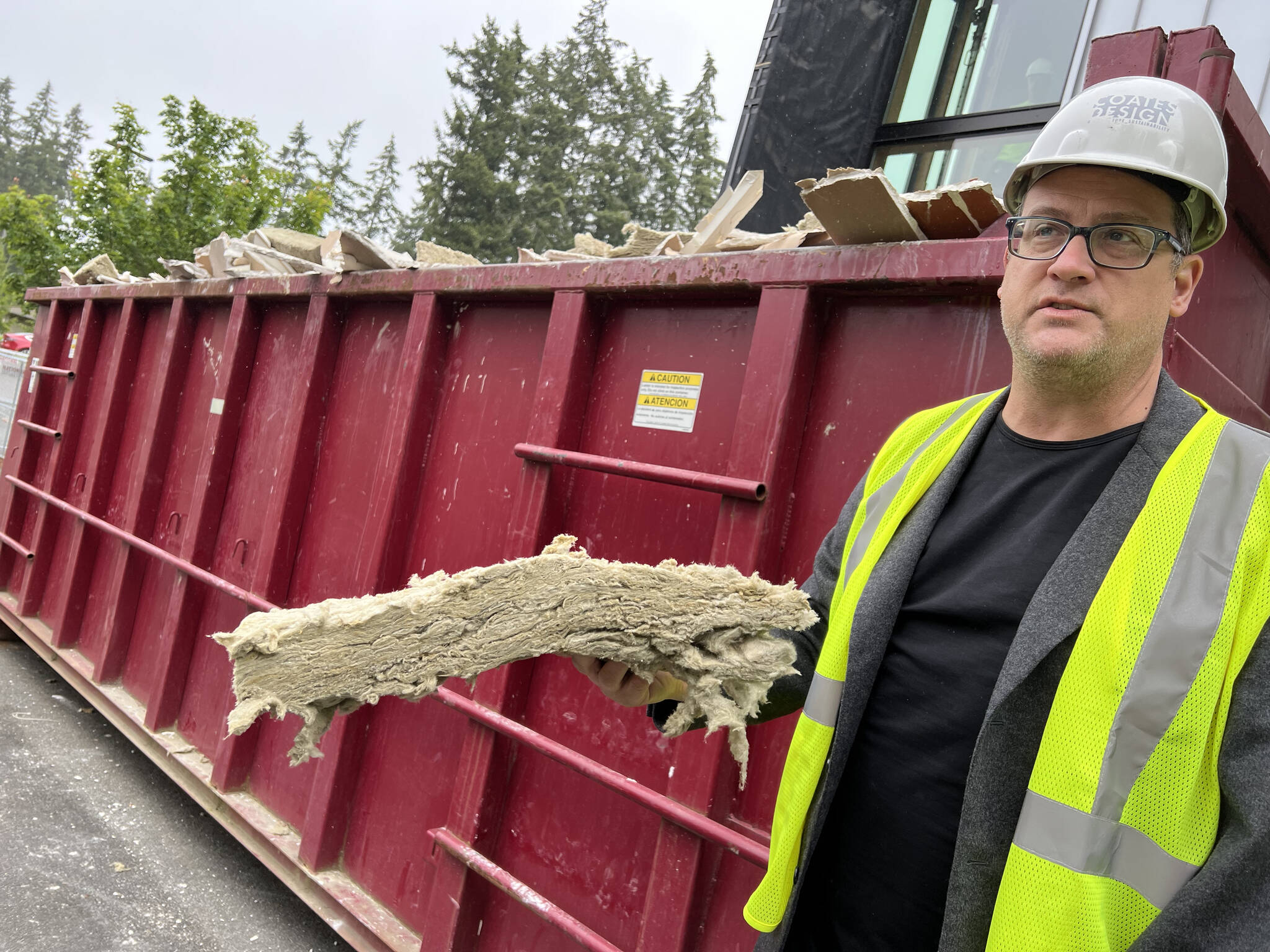On a gray Juneuary morning, a small group was spotted huddling in the drizzle outside a construction site near Highway 305.
The people were discussing items they wanted to “pull” from the building. One member rattled off a list of materials needed that were stored at the location and would be perfect for their project.
The group was made up of reHOME coalition members: Coates Design Architects, Clark Construction, Friends of the Farms and Housing Resources Bainbridge.
They were gathered at the former Harrison Medical Building on Madison Avenue that is going to become the new BI police-court facility. Materials from the demolition will be recycled to make three tiny homes. That project will provide affordable housing for future FOF interns at the Morales Farm on BI.
Coates conceived the idea and brought together the reHOME coalition to reduce waste and to reuse materials already in the community. “As far as I know, this has never been done before,” Matthew Coates said.
It was a dream come true for Coates, who came up with the idea to reduce waste by resourcing materials to keep them out of landfills and provide affordable housing.
“The initial idea and motivation was to be able to repurpose,” Coates said. But the demolition of the Harrison building is an added bonus. “The beauty is the synergy and the timing of all this because we never thought that the timing of this demolition would be happening at exactly the same time we were beginning construction on the reHOME.”
Coates, who designed the Harrison building, said this is a unique opportunity to reuse relatively new materials. The building contained: fir paneling, fir window wraps, doors, carpet tiles, lighting and bathroom fixtures, wiring, wood studs, thermally treated wood siding, and mineral or stone wool insulation that could be reused at different construction sites.
He’s excited the materials are “actually going back and being reinvested into other community projects right here on Bainbridge Island.”
Clark Construction carefully removed, collected, stored and prepared materials that reHOME will use, and some of the reclaimed materials are already finding a second use in a remodeling project in the community.
Victor Cienega, a Clark Construction employee, explained the reclaiming process, “We’re taking this project on to see what was the most salvageable items throughout this building, and there’s a lot of stuff. We went through and took out most of the bathroom accessories to include toilets, toilet paper dispensers, ADA- compliant bathroom sinks, ADA-compliant handlebars and grab bars, and we already repurposed” them to Hyla High School.
Rachele Turnbull, Clark Construction CEO, pointed out the 20-foot containers filled with doors, metal frames, electronic panic hardware, wood and carpet tiles. “It’s really nice and practically brand new.”
Leading the group through the building, Cienega pointed out materials that were in the process of removal and highlighted the fir wood window wraps, solid core doors and cabinets that were in excellent condition.
“It’s spectacular,” Coates said, adding his firm also is the architect for the new police-courts facility, and Clark is the contractor for this and other local projects.
According to Coates, more than 30 percent of Washington landfill is construction waste from buildings that are being demolished and thrown away or leftover scrap material.
“This idea came to me ten years ago because not only do we have an affordable housing problem on Bainbridge Island, but we have a problem in our landfills,” Coates said. “So, we are trying to tackle these two issues with one project.”
Turnbull added: “It’s really awesome that we were successful on a bid of this project because we are a local contractor…A lot of people in the community are going to benefit from this.”
HRB board member Tina Gilbert said people who may be resistant to building tiny homes can now see how beneficial they are. “We have an opportunity for more tiny homes and then we can say, ‘Look how nice they are!’”
FOF executive director Heather Burger was pleased that the project is addressing something that’s been on people’s minds.
“Creating this sustainable design solution that can be replicated across the community starting with us, is just amazing. The shortage of affordable housing for farm interns and our new farmers is greatly affecting local agriculture. This may be the solution because people who come here, serve our community and work here, need to have a place to live,” she said.
Coates added: “I think that by doing this project, we will have established a methodology and a network of repurposing materials in showing that it can be done. And hopefully, it will inspire other people to do that for affordable housing and for housing in general.”
The reHOME tiny house project at Morales Farm is a pro bono endeavor for Coates Design and Clark Construction. No public or city funding will be used. Construction will begin July 11 and is expected to be completed by October. reHOME is seeking volunteers to help build the tiny homes. Sign up or make a donation at www.rehomeproject.com.



